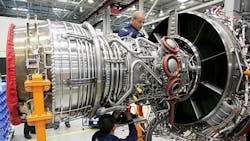British engine maker Rolls-Royce slumped into a record annual net loss in 2016, ravaged by a Brexit-fueled collapse in the pound and a corruption fine.
The loss after tax of £4 billion, equivalent to $4.98 billion, contrasted with a slender profit of £84 million ($1.05 billion) in 2015, the company said in a results statement. Rolls took a vast £4.4 billion ($5.48 billion) hit from the drop in the value of the pound in the wake of Britain’s shock EU exit referendum, alongside a £671 million ($835.60 million) penalty to settle bribery allegations.
The London-listed company, whose engines are used in Airbus and Boeing aircraft, added that underlying pre-tax profits almost halved to £813 million ($1.01 billion).
Rolls-Royce, which also makes power systems for use on land and at sea, stated it was on track with efforts to slash costs and expected a “modest” performance improvement in 2017.
“2016 has been an important year as we accelerated the transformation of Rolls-Royce,” said CEO Warren East, who has overseen a radical restructuring. “We have made operational progress and performed ahead of our expectations for the year as a whole.
“At the same time, we have delivered major changes to our management and processes and, while we have made good progress in our cost cutting and efficiency programs, more needs to be done to ensure we drive sustainable margin improvements within the business.”
The huge annual loss also follows a tough past few years for Rolls, which faced a string of profit warnings on the back of weak demand in its aerospace and marine markets. The company was fined that £671 million in January to settle bribery and corruption claims probed by Britain’s Serious Fraud Office and authorities in Brazil and the United States. Rolls will pay the penalty over five years, but has taken the full cost as an impairment charge against its 2016 profits.
The pound has meanwhile fallen by almost a fifth against the dollar since the Brexit referendum that was held last June. The slide is pushing up the costs of imported goods, sending British annual inflation to the highest levels in 2.5 years.
Official data Tuesday showed 12-month consumer price inflation rising to 1.8% in January — the highest level since June 2014.
“Surging inflation, in particularly food and fuel prices, are eating into disposable incomes and in turn that is starting to hit spending,” said ING bank economist James Smith. “We expect to see further evidence of this in this week’s retail sales data.”
Looking ahead for Rolls, East told reporters that 2017 would be “challenging” for the embattled group: “We have to look after the short term or there won’t be a long term.”
In morning deals, Rolls-Royce shares slid but analysts described the move as a “kneejerk” reaction. Around 1000 GMT, the stock was down 4.9% at 704.50 pence ($8.78), topping the losers’ board on London’s benchmark FTSE 100 index. Analysts remained bullish over the firm’s performance.
“The company chalked up one of the biggest losses in corporate history — but it’s not as bad as it looks, and that is perhaps why we’re seeing the stock coming back a tad after the initial kneejerk,” said Neil Wilson at trading firm ETX Capital.
“Rolls took a £4.4 billion hit from the weak pound following the EU referendum last June and it was fined £671 million to settle bribery charges. Strip those out and the results do not look half as bad.”
By Roland Jackson
Copyright Agence France-Presse, 2017
About the Author
Agence France-Presse
Copyright Agence France-Presse, 2002-2025. AFP text, photos, graphics and logos shall not be reproduced, published, broadcast, rewritten for broadcast or publication or redistributed directly or indirectly in any medium. AFP shall not be held liable for any delays, inaccuracies, errors or omissions in any AFP content, or for any actions taken in consequence.
